Degrees of Change is a series following Fossil Free Newcastle and their campaign to make the university’s investments policy reflect the reality of climate change
By Jack Elliot Marley
Divestment Week drew to a close on Friday, leaving the petition calling on Vice Chancellor Chris Brink to divest the university from fossil fuels 600 names heavier. In a parallel of climate change’s impacts on the lives of all people, the week brought together a broad swathe of Newcastle’s student community who added their voices to a growing call for change.
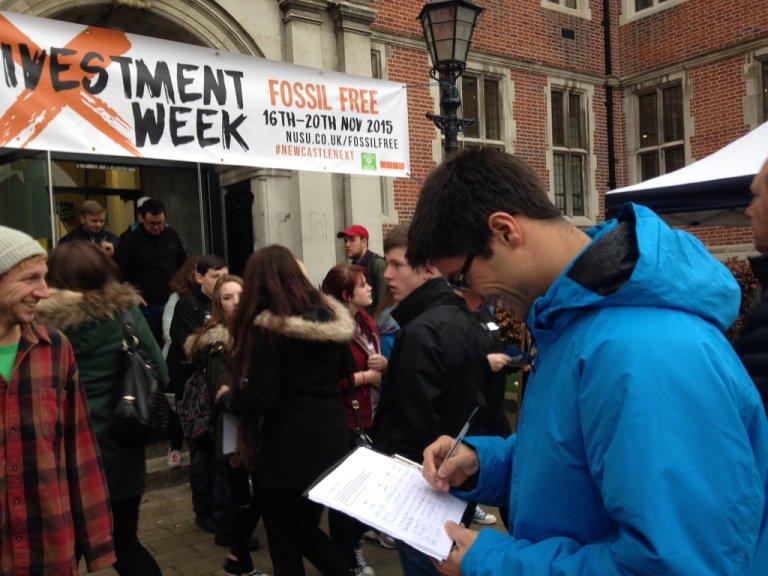
FemSoc opened Monday’s discussions with a reassessment of climate change as a confluence of sex, race and class injustice. In a world where 75% of climate refugees are women, most fossil fuel companies are exclusively owned by men and women occupy less than a fifth of all government positions on the world stage, our focus on polar bears as the greatest victims of fossil fuels forgets the sacrifices that half of the world’s human population are currently making to stay afloat.
“Women are mostly absent from a debate that ultimately affects them” said talk leader and first-year English student Sarah O’Hare. “When they aren’t, their voices are more likely to be marginalised”.
As her partner Phoebe Howard, a history first-year, describes it, “climate change is real, but it doesn’t affect us equally”.
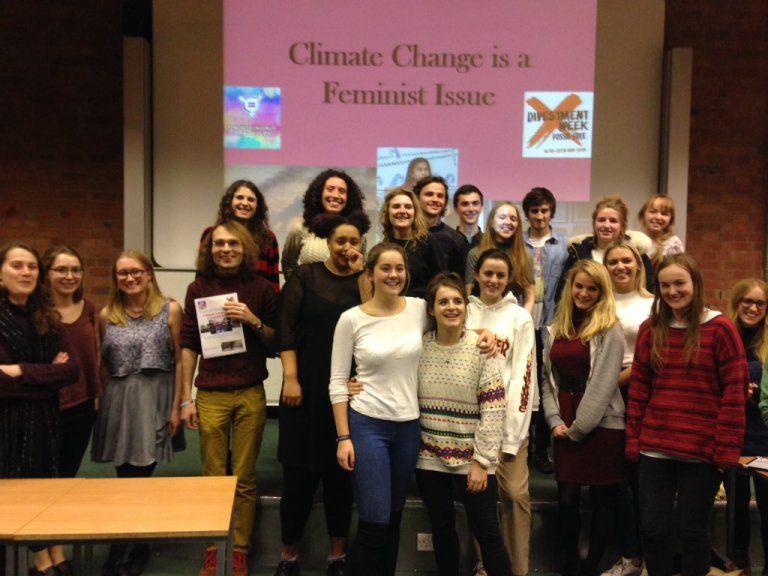
Despite the tail-end of Hurricane Abigail threatening to overshadow it, Tuesday saw tents huddled at the foot of the Student’s Union building, each crowded with those following curiosity and shelter. Many left with white t-shirts coiled up in water-proof bags, the distinctive orange cross of the campaign still drying on them.
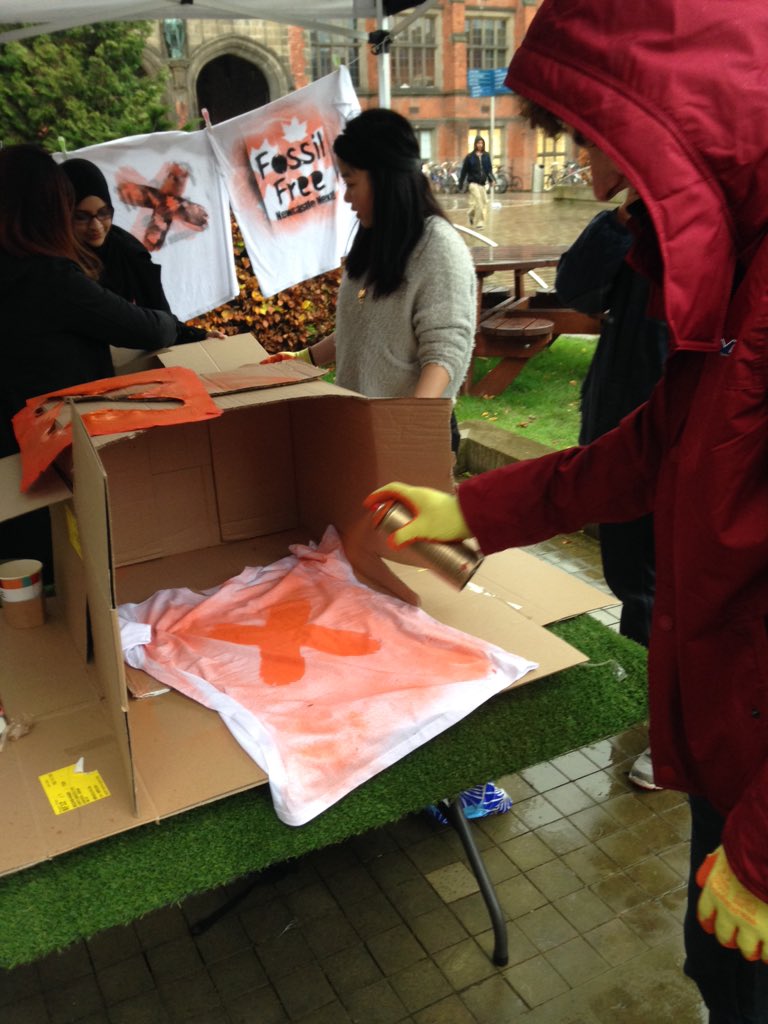
Wednesday brought with it a rare alignment of student politicians. In a talk that evening, Newcastle University’s Young Greens, Labour Students and Conservative Future societies came together to explain how divestment is an apolitical issue too important to get caught up in partisan point-scoring. The event unearthed fertile territory for common ground on the matter of the Paris talks, with each club president acknowledging current commitments fall dizzyingly short.
Attendee Sophie White found the debate helpful. “It was a real eye-opener. Tonight helped me to clarify my own views about divestment.”
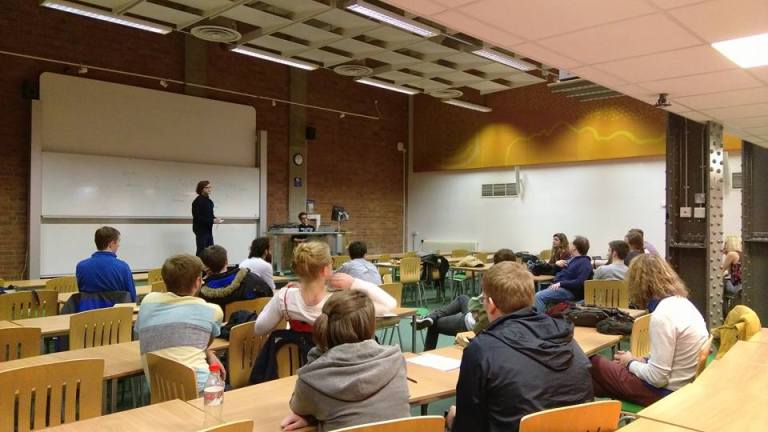
Friday’s Divestival heralded a change in the weather with a change in mood. While the Co-operative Society offered free nutritious and locally-sourced food for anyone engaging with the campaign, the smell of fresh cakes and music from the Newcastle Student Radio Tent filled the air with (for the first time that week) something other than rain. After a week punctuated by debate themes of injustice and disaster, from students of diverse and disparate outlooks, Divestival was the necessary binder. For a broad church of Newcastle students, Divestival found a community spirit.
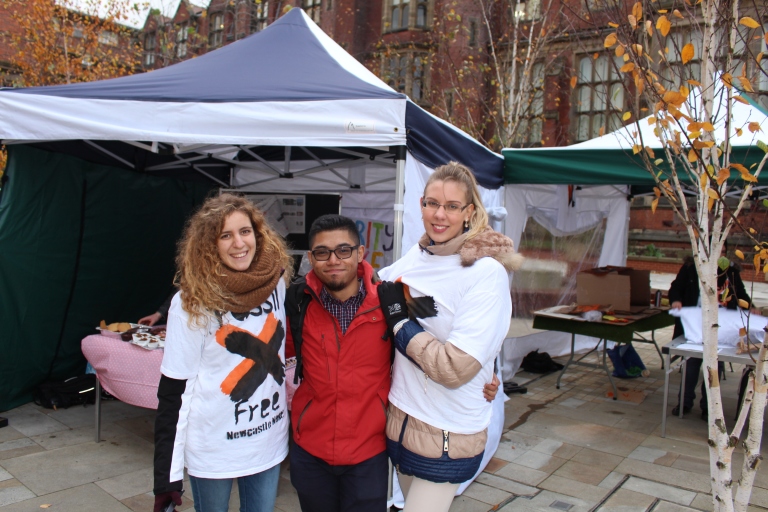
But questions may still linger over its long-term impact.
It was commonly asked by people who braved wind and rain to sign petitions and spray orange crosses onto t-shirts- how much is necessary to make the university take notice? How many signatures? How many raised voices? In a campaign so often fixated by numbers, the answer was surprisingly nuanced.
“We could deliver a petition with 100 names or 10,000”, said campaign leader Rob Noyes. “What’s important is making clear this matters to us.”
Divestment week, like the movement it represents, has succeeded in humanising an issue rooted in cold arithmetic. The past week saw, for the first time ever, students of all backgrounds and aspirations talking frankly and openly about climate change. Even the word “divestment” itself, perhaps once reminiscent of little more than dry boardroom speak has captured the imaginations of young people long accustomed to business-as-usual. Divestment implies ownership, choice and the freedom to decide, something alien to a generation whose opportunities have been stifled since birth by debt. Debt for having the audacity to pursue further education, and debt for an economic system that is consuming beyond our planet’s physical limits.
The most powerful argument emerging from the week’s experiment therefore was one that asked students how they wanted their university to honour the commitment they made when they signed up to a lifetime of student loan repayments. If they’re responsible for much of Newcastle’s private endowment fund, should they not also be responsible for how it is spent?
The question of responsibility hangs over the climate change debate, as it will a few weeks from now in Paris. For students personally, university is a time of exciting possibilities but also one in which we accept sole authority for our own futures. The fight against climate change isn’t one we started, but it’s one our generation will ultimately be responsible for.
And as Divestment Week ends, the fight begins.
